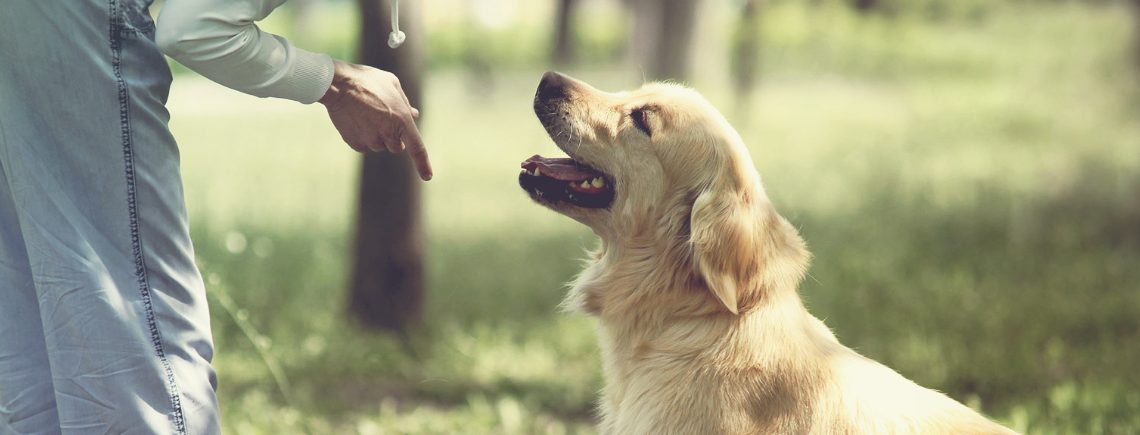Obedience Training Your Dog
Training Your Dog
No matter what breed you have, obedience training is essential to keeping your dog under control and well behaved. Taking the time teach your dog basic commands and to be well-trained will make for a much happier life for both you and your four-legged friend.
Starting young is ideal when it comes to dog training, and even training your puppy for a few minutes every day can go a long way. Don’t be put off if your dog is slightly older, however. It may take them longer to change their habits, but with some patience and effort, it can be done! Whether it is a young puppy or an older dog you have, they can all certainly benefit from learning some basic commands.

Benefits of Training Your Dog
Training your dog plays an essential role in his development and ability to safely interact with you and his surroundings. If your dog is left untrained it can be very annoying and frustrating for you, as it will be much more difficult to keep him under control. This could also lead to severe and preventable behavioural issues, which can result in injury or death to your dog, family, other people or pets.
1.It Is Safer For Your Dog
It is your responsibility to ensure your dog’s safety, and by teaching him to listen to your commands it can prevent him from running onto a busy road or experiencing a potentially fatal conflict with other animals or wildlife.
2. Builds Trust
Training can help deepen the connection between you and your dog. The more you spend time together and begin to understand each other, a mutual respect will develop. This is imperative if you want your dog to listen to you and obey your commands.
3. Keeps Him Under Control
Whether it is the groomers, the vets, the park or a training class, keeping your puppy under control means keeping him safe. You don’t want him running off to another dog in the park or causing a ruckus at a training class. Particularly when you bring them to the vets or to the groomers, it is important to take the time to get your dog used to being touched or worked on. If not, it can risk dental disease, overgrown nails, untreated wounds or infections.
Positive Reinforcement
This reinforces good behaviour by giving a reward. Using this method will make good behaviour much more likely as your dog will be getting something he likes or wants. When your dog gets a reward, they will connect this with whatever they have just done, and will be more likely to do that same thing again next time.
The key to a positive reinforcement in training is to find something which your dog likes; and give them the opportunity to access that motivator as a reward. Every dog will be motivated by different things. This includes food or treats, toys & games, social contact, and behavioural outlets such as chasing moving things.
If you can work out which things are most motivating to your dog in the different situations, training becomes really easy. Remember you control your dog’s access to these nice things so use them in training; have them earn it!
Socialisation Training Your Dog
Socialisation training in puppies and dogs is critical if you intend on taking them virtually anywhere. Socialisation training can help your puppy or adult dog to accept new people, animals, and different environments by exposing him to these things.
Your dog is less likely to develop behavioural problems if he has been socialised, and will generally be more welcome by others. He will behave appropriately around other animals as well as not learn to fear them.
Attending puppy socialisation classes will help them to understand how to interact with other dogs and make it easier to take them out in public as they get older. If your dog is a bit older when introducing socialisation training, take him for frequent walks and gradually work your way up to the dog park, where he can meet other dogs as well as people.
Consistency and Communication
Consistency is key when it comes to training your dog. Training should be done by all members of the household and it is important to ensure that everyone is using the same commands for each task you want your dog to learn. This will make sure there is no confusion; and make it easier for your dog to understand what they are being asked to do.
Reward him with his treat or toy when he does well, and never punish him for not obeying a command. Simply withhold whatever reward motivates him until he does the command you asked. By punishing him he will associate the command with punishment, which of course is the last thing you want. Always keep sessions short as to not overwhelm him, especially if he is a young pup. And most importantly, keep it fun for everyone involved!
If you can, attending a training class with professional is highly recommended. At Petmania we recommend the Association of Professional Dog Trainers in Ireland. They embrace positive, reward-based, training techniques so that the dog and owner can enjoy learning in a friendly environment. Being in a relaxed and friendly environment is proven to maximize learning; and it promotes confidence and initiative in dogs.

